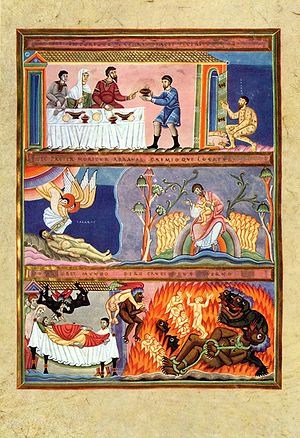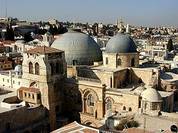This post is a homily on the Gospel for September 25, 2016, which is the parable concerning the treatment of the beggar St. Lazarus and the rich man, who died and went to his just punishment as a result of failing to show compassion and help Lazarus while he lived (Luke 16: 19-31). The homily is by Fr. Joseph Cisetti.
THE COCOON
One of the many wonders of nature is a cocoon. A caterpillar, a worm like creature that crawls upon the ground encloses itself in a type of tomb and then emerges transformed and flies through the air. We rightly see that as a type of death and resurrection.
An image for the Gospel today is that of a cocoon but it is a different type of a cocoon. Rather than a transformation into beauty, there is a deformation into misery that takes place. The Gospel never says that this rich man committed an atrocity or killed anyone, but it is as if he is closed in on himself. Perhaps without being fully aware of it, he is lulled into a self-absorbing stupor that does not seem to go beyond his clothes, his meals and his own doorstep. His wealth is something that he spends on himself and not something he shares with others, not something that he uses to bless others. He is drawn himself so tightly into his cocoon that he cannot seem to see beyond himself.
In the end, our possessions are not owned by us, but loaned to us. They are entrusted to us; obviously so that we can meet our basic needs, but also so that we can help and even bless others.
In Charles Dickens’ A Christmas Carol, early on in story, Ebenezer Scrooge says to the ghost of Jacob Marley, “But you were always a good man of business, Jacob.” And the ghost exclaims, “Business! Mankind was my business. The common welfare was my business; charity, mercy, forbearance, benevolence, were all my business.”
This disturbing parable tells us to pay attention, to wake up and to not be absorbed by ourselves. St. Augustine described sin as being caved in on oneself. Sin closes us in on ourselves and charity draws us out of ourselves and that is where we find joy. The word “ecstasy” literally means to stand outside of oneself.
We are called to live lives of intentional faith that include actions of intentional faith at times perhaps in big ways but also in every little way because mankind is our business. The common welfare is our business; charity, mercy, forbearance, benevolence, are all our business.
This parable tells to pay attention to Moses and the prophets, that is, to pay attention to God’s word given to us in the Scriptures and to God’s word made flesh in the person of Jesus, who did return from the dead and who calls us to new life with Him. Compared to the rest of the world, most of us, even those of modest means, can seem to be the rich man.
The five brothers represent us. We are not to expect some sort of special personalized message, but rather we listen to what we have been told and an also act on it loving God and our neighbor.
Growing up, parents and teachers may have reminded us that our actions have consequences but today the Gospel reminds us that our inactions also have consequences. There is more to being good than not being bad. We can sin by what we do but we can also sin by what we fail to do.
Mother [now Saint] Teresa remarked that you can find Calcutta all over the world, if you have eyes to see. So too, we can find Lazarus all over the world if we have eyes to see. Lazarus can be all around us in those physically suffering, but also in those spiritually suffering and to help serve Him we have the corporal and spiritual works of mercy.
The corporal works of mercy, based largely on Matthew 25, are to feed the hungry, give drink to the thirsty, to visit the sick and imprisoned, to clothe naked and welcome the stranger and to bury the dead. The spiritual works of mercy are to counsel the doubtful and comfort the afflicted, to instruct the ignorant and to admonish sinners, to bear wrongs patiently and forgive offenses willingly and to pray for the living and the death. May we have eyes to see Lazarus, hearts to love him and arms to serve using that with which we have been blessed to bless him.
Informed by the word, sustained by prayer, encouraged by one another and nourished by the Eucharist, let us ask for the grace to not be imprisoned in the cocoon of self-absorption but rather live generous and joyful lives aware of the consequences of selfishness and inaction.
Mankind is our business. The common welfare is our business; charity, mercy, forbearance, benevolence, are all our business.
THE COCOON
One of the many wonders of nature is a cocoon. A caterpillar, a worm like creature that crawls upon the ground encloses itself in a type of tomb and then emerges transformed and flies through the air. We rightly see that as a type of death and resurrection.
An image for the Gospel today is that of a cocoon but it is a different type of a cocoon. Rather than a transformation into beauty, there is a deformation into misery that takes place. The Gospel never says that this rich man committed an atrocity or killed anyone, but it is as if he is closed in on himself. Perhaps without being fully aware of it, he is lulled into a self-absorbing stupor that does not seem to go beyond his clothes, his meals and his own doorstep. His wealth is something that he spends on himself and not something he shares with others, not something that he uses to bless others. He is drawn himself so tightly into his cocoon that he cannot seem to see beyond himself.
In the end, our possessions are not owned by us, but loaned to us. They are entrusted to us; obviously so that we can meet our basic needs, but also so that we can help and even bless others.
In Charles Dickens’ A Christmas Carol, early on in story, Ebenezer Scrooge says to the ghost of Jacob Marley, “But you were always a good man of business, Jacob.” And the ghost exclaims, “Business! Mankind was my business. The common welfare was my business; charity, mercy, forbearance, benevolence, were all my business.”
This disturbing parable tells us to pay attention, to wake up and to not be absorbed by ourselves. St. Augustine described sin as being caved in on oneself. Sin closes us in on ourselves and charity draws us out of ourselves and that is where we find joy. The word “ecstasy” literally means to stand outside of oneself.
We are called to live lives of intentional faith that include actions of intentional faith at times perhaps in big ways but also in every little way because mankind is our business. The common welfare is our business; charity, mercy, forbearance, benevolence, are all our business.
This parable tells to pay attention to Moses and the prophets, that is, to pay attention to God’s word given to us in the Scriptures and to God’s word made flesh in the person of Jesus, who did return from the dead and who calls us to new life with Him. Compared to the rest of the world, most of us, even those of modest means, can seem to be the rich man.
The five brothers represent us. We are not to expect some sort of special personalized message, but rather we listen to what we have been told and an also act on it loving God and our neighbor.
Growing up, parents and teachers may have reminded us that our actions have consequences but today the Gospel reminds us that our inactions also have consequences. There is more to being good than not being bad. We can sin by what we do but we can also sin by what we fail to do.
Mother [now Saint] Teresa remarked that you can find Calcutta all over the world, if you have eyes to see. So too, we can find Lazarus all over the world if we have eyes to see. Lazarus can be all around us in those physically suffering, but also in those spiritually suffering and to help serve Him we have the corporal and spiritual works of mercy.
The corporal works of mercy, based largely on Matthew 25, are to feed the hungry, give drink to the thirsty, to visit the sick and imprisoned, to clothe naked and welcome the stranger and to bury the dead. The spiritual works of mercy are to counsel the doubtful and comfort the afflicted, to instruct the ignorant and to admonish sinners, to bear wrongs patiently and forgive offenses willingly and to pray for the living and the death. May we have eyes to see Lazarus, hearts to love him and arms to serve using that with which we have been blessed to bless him.
Informed by the word, sustained by prayer, encouraged by one another and nourished by the Eucharist, let us ask for the grace to not be imprisoned in the cocoon of self-absorption but rather live generous and joyful lives aware of the consequences of selfishness and inaction.
Mankind is our business. The common welfare is our business; charity, mercy, forbearance, benevolence, are all our business.

 RSS Feed
RSS Feed

